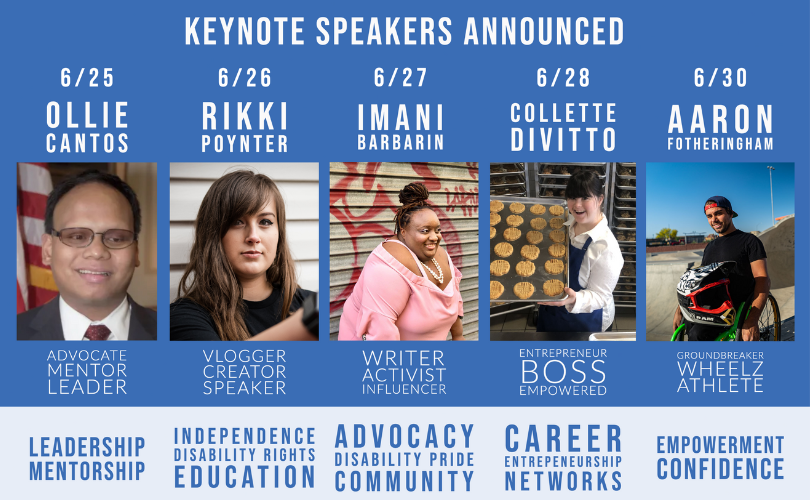PYD held the 2022 Youth Leadership Forum (YLF)–a virtual conference for youth and young adults with disabilities to help them build leadership skills and prepare for employment, higher education, and independent living–from June 25th – June 30th, 2022.
Throughout the course of the multi-day conference, YLF participants engaged in both small and large group discussions and workshops on topics such as: self-advocacy, disability pride, assistive technology, independent living, employment skills, career exploration, higher education, legislative advocacy, the Disability Rights Movement, and community participation.
There were two ways that young people with disabilities could get involved:
- Be a YLF Delegate: Delegates are youths with a disability who are between the ages of 16-22, are either in their last two years of high school or are attending a transition program, and want to develop self-advocacy and leadership skills, begin to plan career goals, and build a network of supports and friends.
- Become a Peer Leader: Peer leaders are young adults with a disability between the ages of 18-25, are currently out of high school and are working and/or taking college classes, and are responsible to help plan YLF activities and mentor Delegates.
We had an amazing year, check out these numbers!
- 34 Delegates
- 15 Peer Leaders
- 25 Staff Members
- 26 Speakers
- 25 Career Bruncheon Mentors
- 28 Businesses at the Resource Fair
- 34 Workshops / Activities
We’d especially like to thank our supporting partners and funders: Perkins School for the Blind, Boston Center for Independent Living, Stavros, Empowering People for Inclusive Communities (EPIC), Easterseals Massachusetts, Massachusetts Rehabilitation Commission (MRC), Massachusetts Department of Mental Health, Massachusetts Department of Developmental Services, Massachusetts Developmental Disabilities Council, and Denny’s Hungry for Education.
Keep reading to learn what we covered throughout the five days!
Saturday, June 25th
This was the first day of YLF, which consisted of one keynote, one group project, three workshops, and a social engagement. The themes of these sessions focused on leadership and mentorship.
Keynote with Ollie Cantos
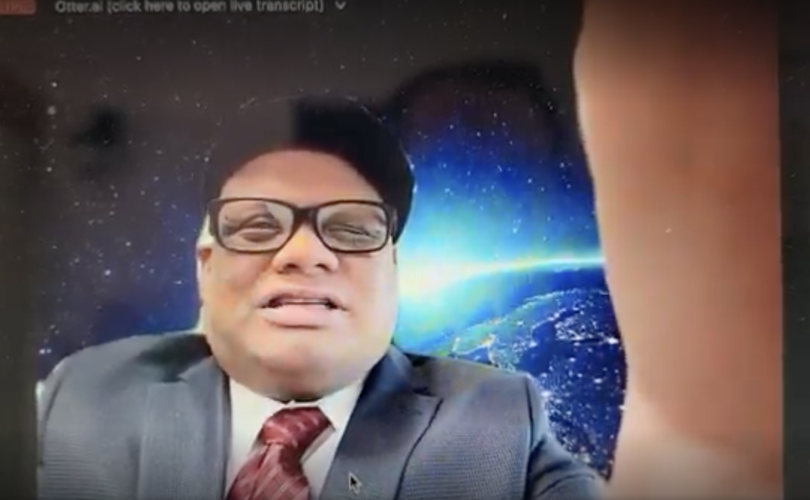
We kicked off the conference with a keynote by Ollie Cantos, an attorney active in the Civil Rights arena since 1990. A self-advocate who is blind, Cantos is most grateful for his 20-year-old, adopted triplet sons. He works for the federal government, is a member of the President’s Committee for People with Intellectual Disabilities (PCPID), is the Chairman of the Board of Advisors for Scholarships for Eagles, a board member of the Virginia Organization of Parents of Blind Children, an attorney mentor for the ABA Commission on Disability Rights, and a member of the US Coast Guard Auxiliary. Ollie is also a member of RespectAbility’s Board of Advisors.
Throughout Ollie’s keynote, he shared the struggles he faced as a youth, where he would get bullied for having a disability and therefore tried to hide it. He also told the story of failing the bar exam when having the dream to be a lawyer, and although he felt like giving up, he tried again and is now working in his dream career.
As Ollie reminded participants, “Just because we’re blind or have any type of disability doesn’t mean that we should be ashamed about it. In fact, it’s part of who we are and we don’t need to apologize for who we are.”
No matter who we are and where we have been, today is the beginning of the rest of our lives. Ollie is an amazing example of what can happen when you keep working hard, regardless of what’s happened.
Small Group Project
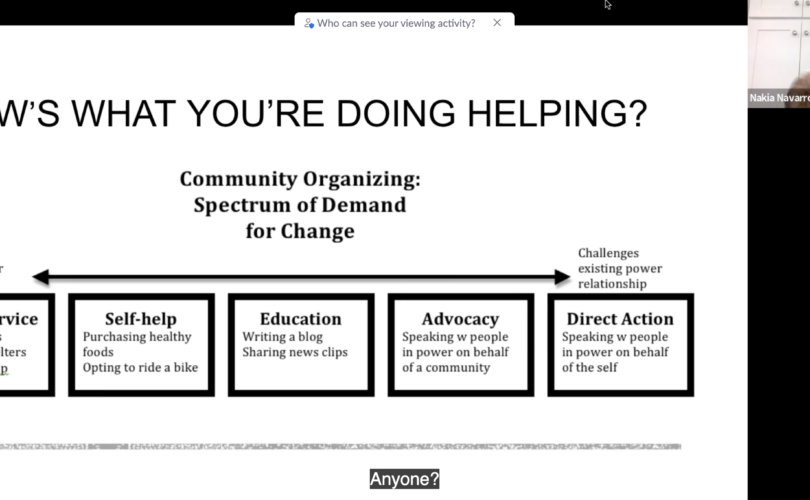
Nakia Navarro, CEO of Building Audacity, led a series of small group projects throughout the entire week of YLF. Building Audacity was founded with the purpose of increasing youth power by supporting youth-led change-making and providing resources to adults interested in creating inclusive, youth-focused learning spaces.
At the start of Nakia’s workshop, she asked delegates two questions and encouraged them to leave their answers in the chat:
- What does freedom look like?
- How do we get to freedom?
After everyone had a moment to respond, Nakia presented the change spectrum, which helps people to see how what they’re doing is helping.
As she shared, “Before you get yourself into change-making, you really need to understand what exactly change is. What type of change are you trying to make? Then you can figure out, ‘How do I have conversations with folks to bring them in and try to move them along according to this change spectrum?’”
Nakia encouraged the participants to think about the type of change they would make, how they would use the change spectrum to make that happen, and the “one word” they felt at the end of the presentation. This project had everyone’s minds buzzing about how they would like to use their talents to make a difference in the world.
Lead On! Embracing Our Legacy and Remaining Ever Vigilant
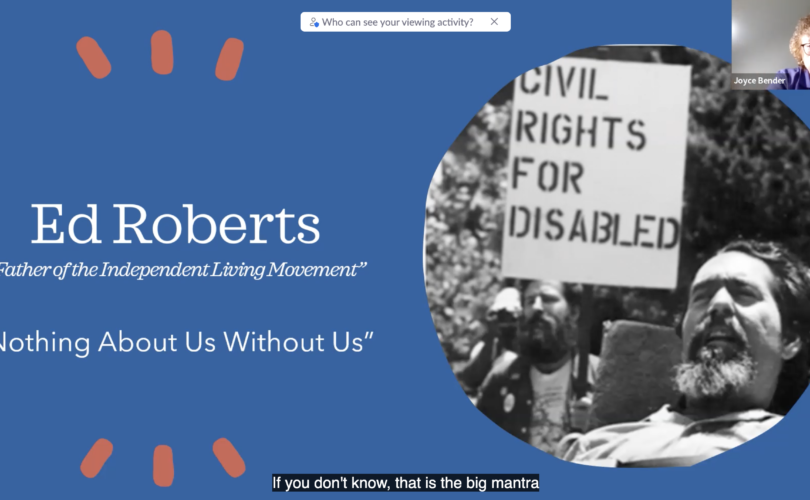
Joyce Bender, CEO and founder of Bender Consulting Services, led a workshop on the various movements and laws regarding equality for people with disabilities. Some of these prominent moments in history included the Independent Living Movement, the Rehabilitation Act of 1973, the San Francisco Sit-In of 1977, the Individuals with Disabilities Education Act, the Americans with Disabilities Act, and the ADA Amendments Act.
Throughout Joyce’s session, she shared how we can focus on various components to continue to fight for equality, especially in the workforce, and she covered various leadership styles. Through her presentation, we learned the importance of collaborating, taking action, focusing on servitude, and networking.
Joyce explained, “I love young people with disabilities, just like these young people today … Don’t underestimate them. People make such a mistake underestimating young people with disabilities because they are changers, they are on fire, they are making a difference, and they’re letting their voices be heard. And that’s the only way we can all succeed, is if we all work together.”
Her message showed participants that if there’s been success with leading a movement before, it can happen again.
Leading with Authenticity
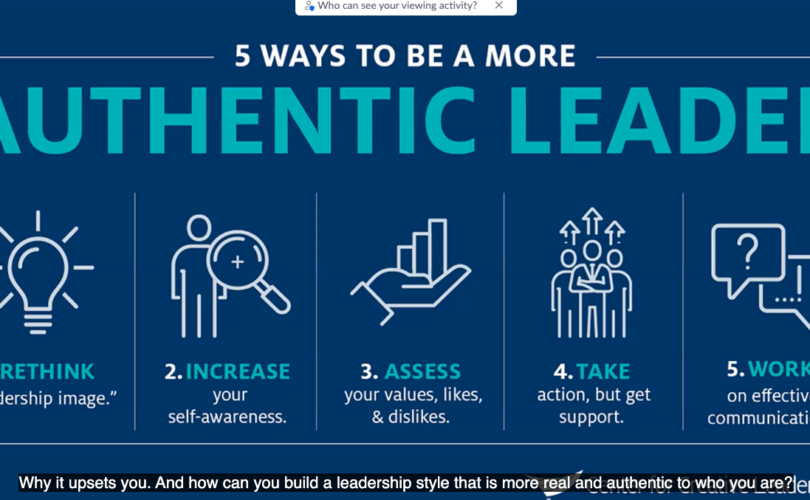
Dante DiBattista–speaker, leadership expert, and consultant–gave a presentation on what leadership means and what it means to be authentic. The goals of his workshop were to:
- Define leadership and authenticity
- Help identify the participants’ leadership styles
- Encourage participants to reflect on how to use their leadership style to be true to who they are
Through his session, he shared how who we are as people impacts our leadership style. Dante also emphasized that we can be whoever we want to be by discovering what skills we have that can change the world in the future, reminding our participants that they are so much more than their disability.
Dante closed his session with the following statement: “That’s why these conversations are so important … This is where the power of the group comes together. We work together to pool resources together and find solutions … We change the world by finding out what we can do to make the largest impact and use that influence to then help change people’s perception.”
Using Research to Fuel Activism
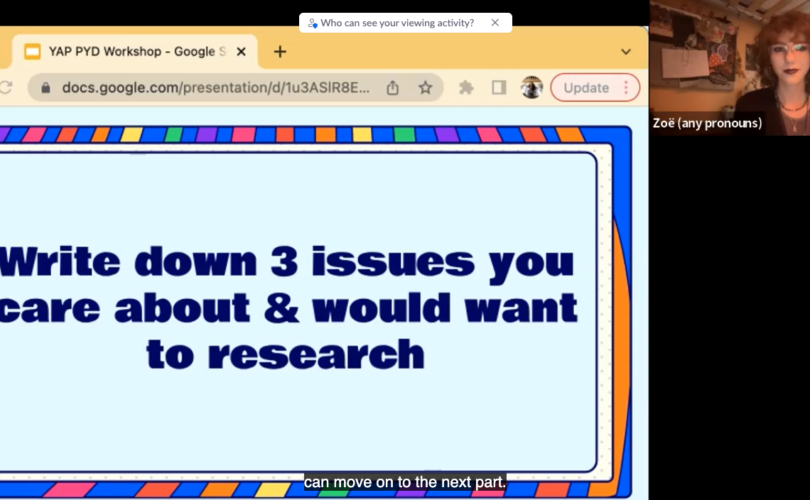
The Youth Activism Project (YAP) gave an overview of their own research they conducted to show YLF participants how they can do the same for any social issue they’re passionate about.
YAP’s own research for the LGBTQ+ community consisted of the following:
- For ally youth: On a scale of 1-10, how well do they feel they support their friends/peers in the LGBTQ+ community?
- For LGBTQ+ youth: On a scale of 1-10, how accepting do they consider their communities (school, friends, etc.) to be of LGBTQ+ youth?
Zoe, the leader of this workshop, helped youth understand what makes a good survey question and gave an example so youth could come up with their own survey question on a topic of interest to them. YAP then gave an overview of how to conduct the research and split participants into breakout rooms to design their own research in groups.
Through this session, our youth came together to achieve one common goal that means a lot to them through the tools, resources, and knowledge they were given.
Social Engagement: Fun with Improv
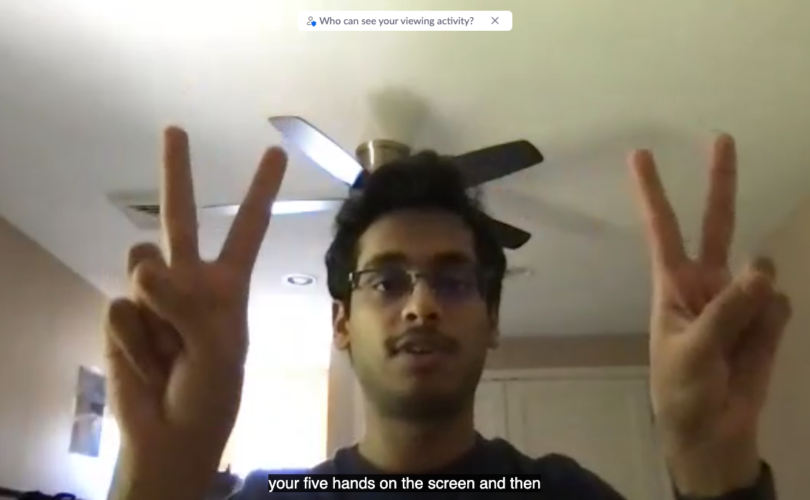
PYD staff member Ryan Kell wrapped up the first day of YLF with a fun activity for participants, focusing on improv through a series of games. As Ryan explained, “Improv is being yourself, being spontaneous, being silly, having fun. That’s really what we’re here for. What I think is really cool about it and how it connects to social interactions is that it’s a really good way to bond with other people because if you think about people that we connect with or are close with, a lot of times, it’s our sense of humor or our silliness or just being ourselves is how we connect with someone.”
The first game was “yes and picnics,” where participants shared what they would bring to a picnic and then passed it onto someone else to keep the story going.
“Mirror” was the second game, which involved participants doing various movements on the screen with their hands and their head as a “group mind,” with the whole goal to get everyone else to copy what they’re doing.
The third game was “group story,” where everyone created one story together. One participant started the game by giving a suggestion for a character, and then Ryan said the first sentence, passed it onto someone else to develop the story as they’d like, and then kept the train going. It was exciting to see how creative everyone was as they crafted this story!
“Wind down” was the fourth and final game of this social engagement, which happened in breakout rooms. This consisted of playing the activity “five things,” where you would ask someone a question and they would have to answer it with five responses. The question that was shared at the beginning was, “What are five things you’re looking forward to this summer?” Everyone had fun answers for this game as they shared what they were most excited about for the season!
Through these improv activities, participants were able to build their confidence, enhance their social skills, and participate in camaraderie as they interacted with their peers and came up with creative answers to questions on the spot.
Sunday, June 26th
After a successful first day of YLF, it was hard to believe how the second day could possibly be any better – but it was! The themes for day two were independence, disability rights, and education.
Keynote with Rikki Poynter
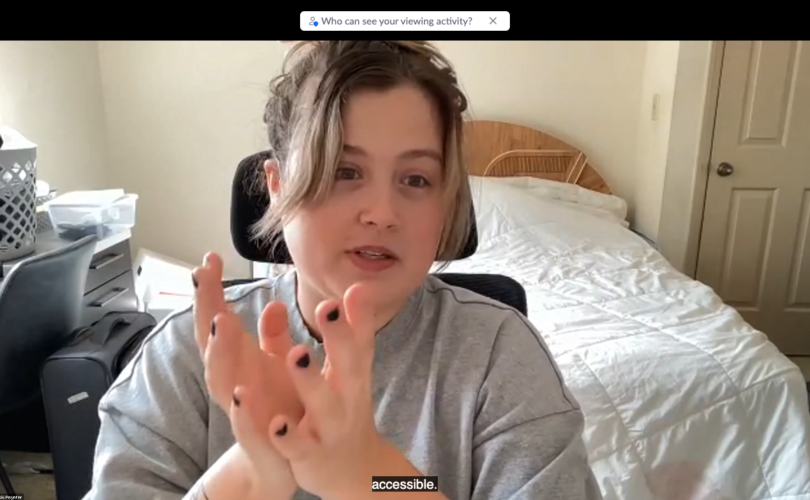
Rikki Poynter started the day for us through her keynote, “Becoming My Own Advocate.” A YouTuber, writer, accessibility consultant, and public speaker, Rikki started her YouTube career in July 2010 being a makeup vlogger until her shift to more educational and lifestyle content in late 2013. She is known for disability advocacy and for her efforts for proper closed captioning on YouTube, and she often talks about disability (deafness, chronic pain, and fatigue), mental health, child abuse, and more.
Throughout Rikki’s keynote, she openly talked about her struggles as a child with a disability. With no assistive devices, no ASL, no deaf schools, no accessibility in schools, and more, Rikki didn’t know how to advocate for herself in school, at work, and in other social situations, but she quickly realized it was something she had to do and learned how to do it.
Wanting to help others who were also going through this, Rikki made a YouTube channel about deafness / disability / accessibility, sharing information that will help people to know their rights and gather important resources. She also dove into her movement #NoMoreCRAPtions, which advocated for better captions on YouTube.
Throughout Rikki’s keynote, she emphasized the importance of advocacy and sticking up for yourself and what you deserve when you don’t have anyone else to do it for you. When a participant asked her how she was able to keep going when she was denied many opportunities, she answered, “Having that support system of fellow deaf friends who tell you to keep going, hearing some allies and friends start captioning and making their content more accessible.”
This was an incredibly important message for our youth, providing them with the confidence to be their own advocates when needed.
Small Group Project
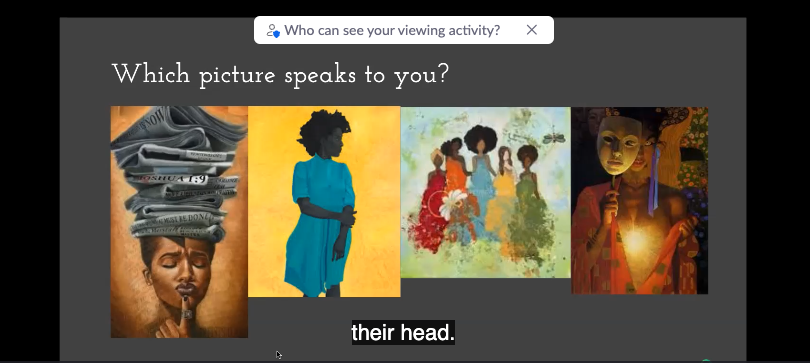
Nakia Navarro began the second segment of this group project and started by showing a slide of four photos, asking participants to point out which picture speaks to them, and encouraging them to share what it reminds them of.
From there, Nakia started the “5 Things” activity, where participants selected five things they’re really interested in changing, explained what they want changed, noted who has the power to make the changes they want, and shared what actions they will take to make the desired changes. These social issues included healthcare, education, sanitation / environment, ableism, LGBTQ+ rights, and more.
As Nakia stated, “You can make change. You absolutely can make change. It doesn’t matter that you’re just one person. It just matters that you want to make change. That’s what matters.”
Through this activity, participants realized that once they broke down what they would like to change into actionable steps, achieving that goal is more attainable than they thought – especially when you have a group of people who all want the same outcome as you coming together.
Resume Personalization
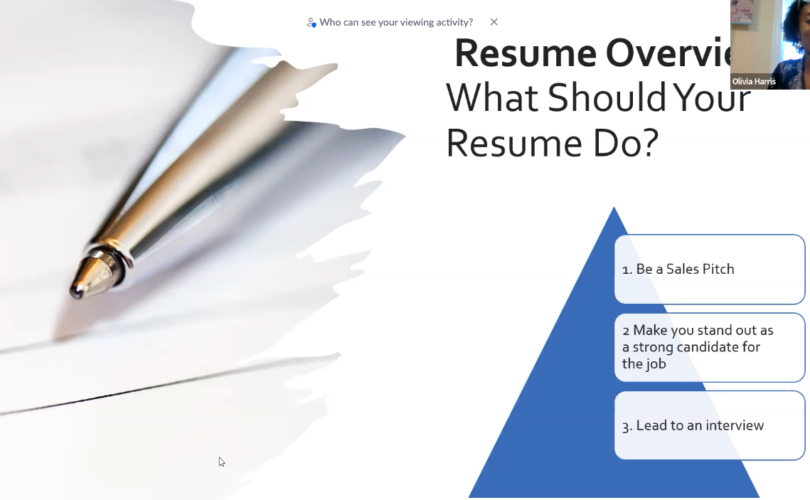
PYD staff member Olivia Harris led a workshop on how to craft your resume to stand out in front of employers when preparing to start your career. Through this session, the objectives were for our youth to:
- Understand the elements of a strong resume
- Craft a resume specific to the job they want
- Create a visually appealing resume
With this new information they learned, participants had the confidence to build a resume that will help them to land the career they want, felt accomplished after looking through everything they’ve done, and knew exactly what steps they needed to take to start their resume.
This workshop tied into the theme of independence, helping people with disabilities to know that it’s absolutely possible for them to find a career they love.
As our presenter, Olivia, shared: “This summer I was excited to lead the Resume Personalization Workshop for the YLF participants. It was a great opportunity for us to collectively identify the diverse talents and skills of our youth and highlight the ways they are able to showcase these qualities to potential employers. I was impressed by the thoughtful ways the delegates and peer leaders engaged with the workshop material.”
Supporting Your Education Goals
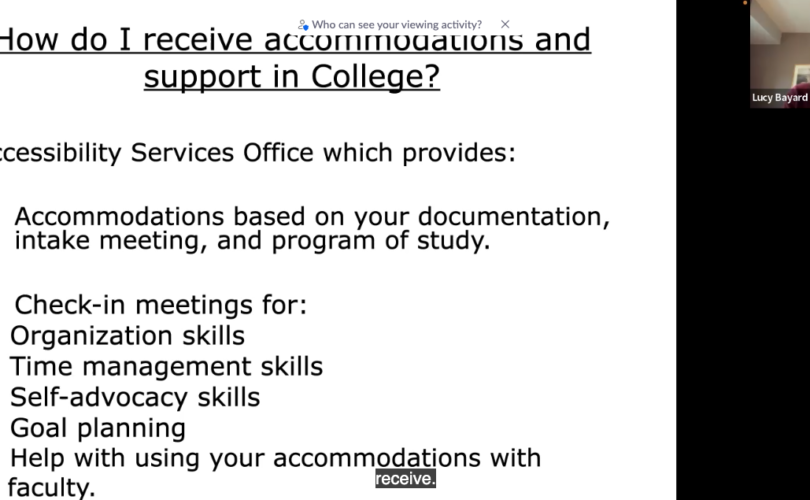
During the next session, Lucy Bayard, Director of Accessibility Services at Simmons University, gave an overview on supporting your education goals.
Throughout this workshop, Lucy covered:
- Options for learning after high school
- Rights to equal access for learning and programming in college
- How to access services and support in college
She helped to remove the overwhelm that many people with disabilities may feel about going to school by sharing the services, support, accommodations, etc. that are available to students once they begin this new journey.
As Lucy emphasized, “Asking for help is a strength … and knowing that there’s a lot of support and services to make you successful … You can be successful and you can achieve your personal and academic goals.”
She also shared the different options in higher ed and explained how career counselors can help people with disabilities to choose the right program.
Lucy noted, “Academic accommodations support you to succeed in the classroom. They allow you to have the opportunity to demonstrate your knowledge learned in a way that’s fair with other students … It gives you the opportunity, based on your needs, to learn in the same, equal way as other students and demonstrate your knowledge … It makes sure you’re evaluated on your abilities, not your disabilities.”
At the end, she led a very interactive and engaging Q&A session, helping to share information with our youth about all of the educational opportunities they have.
Self-Care in a Time of Change
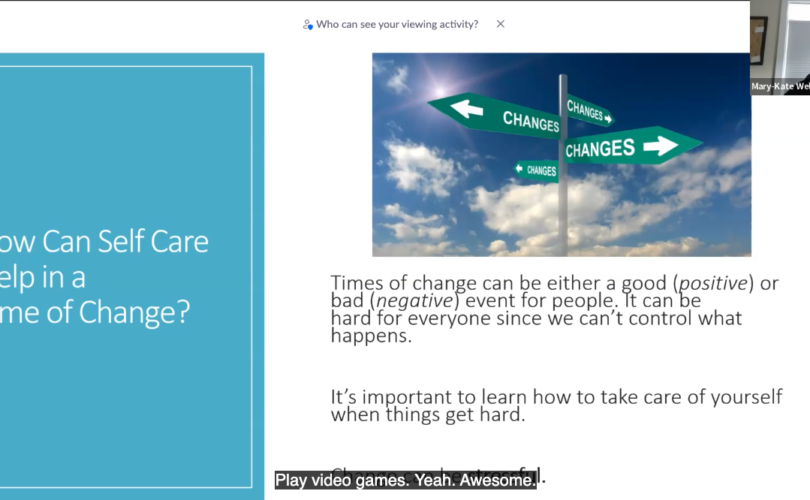
An important topic for people with disabilities is the necessity for self-care, especially during a time of change. Cody Reese and Mary-Kate Wells from the Boston Center for Independent Living led this workshop to educate participants on how they can take care of themselves.
Cody and Mary-Kate started the session with the definition of self-care: “Self-care is the practice of taking care of yourself to protect or improve your well-being and happiness … It’s all different ways we can take care of ourselves and support our daily lives.”
From there, they gave an overview of the many different types of self-care–physical, spiritual, social, mental, and emotional–and explained why we need it:
- It helps you perform at your best.
- It supports and improves your well-being.
- It helps maintain confidence and self-esteem.
- It allows you to feel well-rested and energized.
- It builds your resilience.
Cody and Mary-Kate emphasized how self-care can help during a stressful time of change, especially when it comes to setting boundaries, which is a form of self-advocacy.
They closed the workshop with a self-care action plan and encouraged our youth to make their own. This action plan included:
- Reminding yourself it’s okay to take time to yourself
- Finding what works for you
- Making a “warm and fuzzy file” of things that make you smile
- Identifying times you should practice self-care
Cody and Mary-Kate were able to give participants the tools and resources they needed to achieve independent living and the act of taking care of themselves.
Talent Discovery Workshop
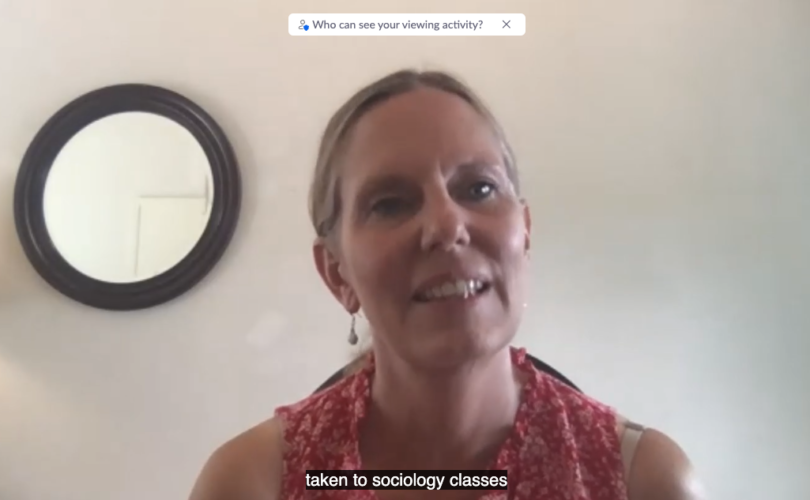
In the next session, Emily Berheide, a talent discovery specialist, led participants through a workshop that helped them to discover what their talents are. Emily’s passion is helping young people identify what their natural talents are and turning that into a career / profession.
She started the session by playing a video that shared Zack Gottsagen’s story. Zack is a man with Down syndrome who had a really big passion for acting ever since he was a kid and made his breakout role for the film The Peanut Butter Falcon. After watching this short clip, Emily encouraged participants to think about something they enjoy doing and share them.
As she explained, “When you’re doing what lights you up, what gives you joy, what gives you passion, that shows. People can see that, and that’s what helps take the next step and find the next step in doing a career that you love.”
She played other videos that told the stories of people with disabilities who found the things they really enjoyed doing and turned them into careers. By sharing these stories, it showed our youth that if these people can achieve their dreams, regardless of what they are, so can they.
What is College? Understanding Your Higher Education Options and the Skills You Need to Succeed
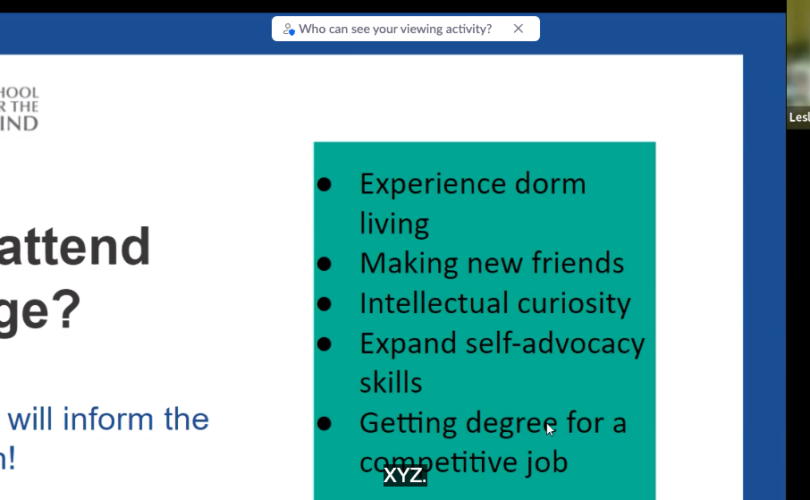
Leslie Thatcher and Alexandra LaVoie from Perkins School for the Blind led a workshop that gave an overview of higher education options, which was extremely helpful for people with disabilities who may not know how to navigate these journeys. They gave an overview of the different types of colleges–community college, tribal college, four year college, special programs, and online vs hybrid–and then explained the reasons why one should attend college:
- Experience dorm living
- Make new friends
- Develop intellectual curiosity
- Expand self-advocacy skills
- Get degree for a competitive job
Leslie and Alexandra also covered accessing accommodations and how they’re beneficial to people with disabilities. As they noted, “Advocating for accommodations requires really strong self-determination skills, problem-solving, and planning skills.”
By giving an inside look into this journey, participants felt an increase in confidence knowing that they have the tools and information needed to make it possible for them to attend college and be successful in the process.
Monday, June 27th
The third day of YLF offered the most amount of workshops and activities that all centered around advocacy, disability pride, and community.
Keynote with Imani Barbarin
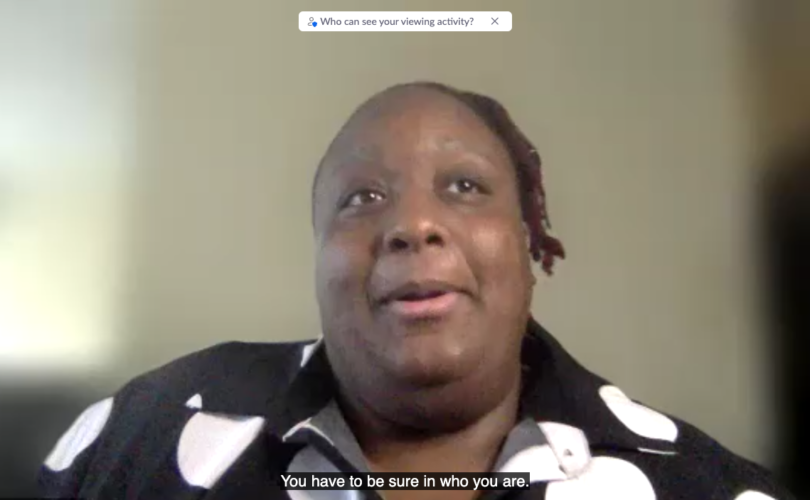
We started day three of YLF with a keynote from Imani Barbarin, a disability rights and inclusion activist and speaker who uses her voice and social media platforms to create conversations engaging the disability community. Born with cerebral palsy, Imani often writes and uses her platform to speak from the perspective of a disabled black woman.
In the last few years, she has created over a dozen trending hashtags that allow disabled folk the opportunity to have their perspectives heard while forcing the world to take notice, such as #PatientsAreNotFaking, #ThingsDisabledPeopleKnow, #AbledsAreWeird, and others.
Imani shared an inspirational anecdote of her disability from her own perspective:
“I grew up in all white spaces, I grew up in a normalized education system, and I grew up very much not so in touch with my disability identity, nor knowing too many disability advocates in my community or at all. I grew up believing that if I tried hard enough, that if I overcame my disability, all of these stories that we tell ourselves what we have to do with our disability, if I did all of those things, I would be fine. I would be okay … We tell ourselves these things, and society tells us these things, so we don’t have to deal with the core issue of being disabled in this country.”
She feels passionate about sharing her stories with others because people see a lot of statistics and data about people with disabilities, but they don’t realize there’s a PERSON behind those numbers.
As Imani explained, “I talk about disability because it matters to my daily life … You all know that disability affects every single thing we do, every single day.”
She shared with our youth that no matter how discouraging people might be to them, to their work, and to what they have to say, they still have to say it. Imani stressed the importance of our youth advocating for themselves: “Self-advocacy requires you to live out loud and to move loudly in spaces where you are preferably unheard. You have to make sure that every word that you use is to the benefit of yourself and to your community.”
At the end, Imani asked participants to share in the chat how they like to advocate and what tools they like to use. Answers included: writing blog posts, speaking up, staying true to yourself, telling stories, asking questions, speaking on panels, and more.
By hearing Imani’s perspective, our youth felt inspired to live their stories out loud, regardless of what society may think.
Small Group Project
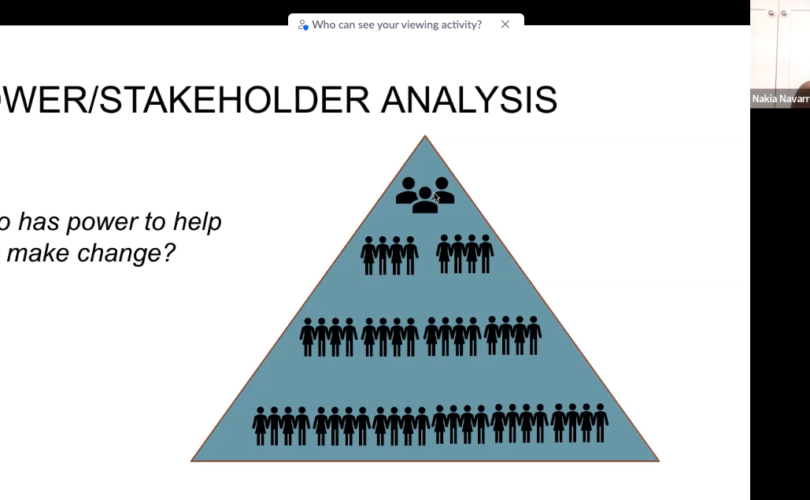
Continuing with her small group project, Nakia Navarro kicked off this activity by chatting about who has the power to make change and showed a power / stakeholder analysis to talk specifically about the people within a college setting who have the opportunity to make change in regards to disability.
She walked participants through what opponents, allies, and accomplices are and how they aid in making, or not making, change. From there, everyone went into breakout rooms to get together with their groups, think about what they wanted to change, and brainstorm who in their network can help make that change.
As Nakia reminded everyone, “It’s not about who’s right, it’s not about who’s wrong, it’s about the ability to make the choice.”
By breaking down the action of making a change into smaller steps, participants felt more comfortable that they had the power and ability to make it happen.
Assistive Technology
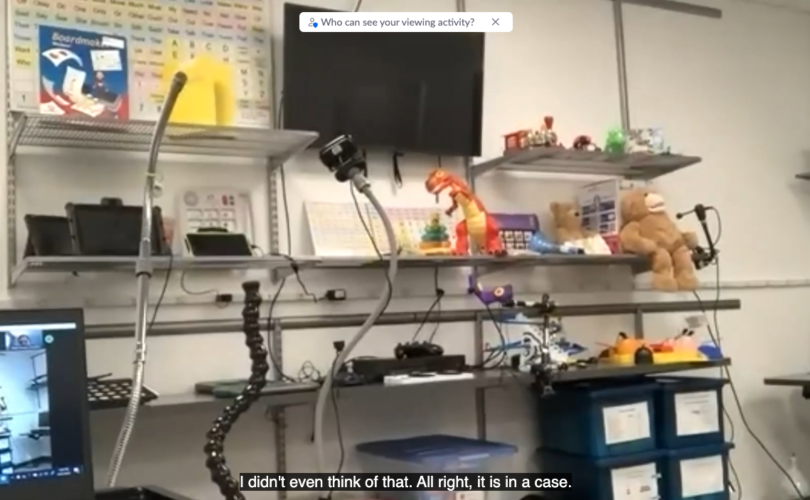
YLF then took a virtual field trip to the Easterseals Massachusetts Assistive Technology Regional Center, where Michele Boutelle and Rachel Donovan covered:
- At least 3 programs that can help individuals obtain Assistive Technology
- Various types of Assistive Technology and how it can help meet individual goals
- An inside look into how devices are used and how they work
Michele and Rachel started by sharing what assistive technology is and how it addresses needs in the areas of vision, hearing and listening, daily living and safety, and more. They also gave an overview of various programs that provide assistive technology, which is helpful for any delegate who may not have that information already.
From there, Michele and Rachel gave a tour of the center and walked participants through the various areas: communication, switch access, ergonomics and computer access, smarthome accessibility, hearing, vision, activities of daily living, and more. They gave excellent demonstrations of the devices and assistive technology, giving people with disabilities the confidence to know they can achieve independent living with the help of these tools.
Leadership, Challenge, and Support
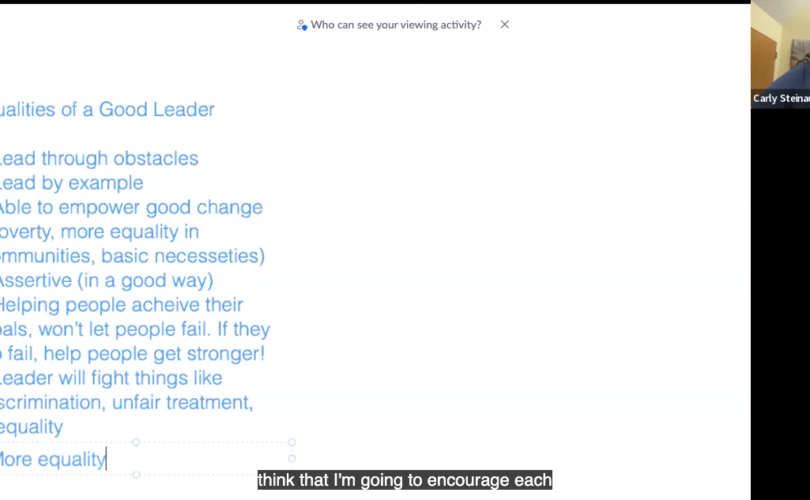
Carly Steinauer from Waypoint Adventures, a company that provides accessible outdoor adventures for people with disabilities, led delegates through a presentation that focused on leadership, challenge, and support.
At the beginning, Carly asked everyone to share what a leader is and what makes a good leader, particularly when it comes to doing something that’s outside of your comfort zone. She walked participants through the Challenge Circle, which is a tool that can be used when feeling overwhelmed about trying something new:
- Comfort zone: when a situation feels easy and / or familiar
- Challenge zone: where something feels difficult or new but not impossible
- Panic zone: where something feels too overwhelming and causes you to freak out
Carly played a video from disability activist Judy Heumann, who spoke about the challenge she faced when she was becoming a teacher. After the video, Carly explained how Judy walked through the Challenge Circle when navigating this difficult situation, making her a leader to others.
As she shared, “As leaders, it’s your job to support others … Just like we all experience challenges differently … Everyone also has different ways that they like to receive support.”
Carly explained how youth can support others to challenge themselves and grow:
- Share their experiences
- Lead by example by stepping outside of their own comfort zone
She left everyone to think about 1-3 things they can do to support someone else to do something in their challenge zone OR something they want to do that’s outside of their comfort zone and what they need in order to be successful. By thinking this through, participants realized that something that may have originally seemed impossible to them may not be as difficult as they thought.
Yoga
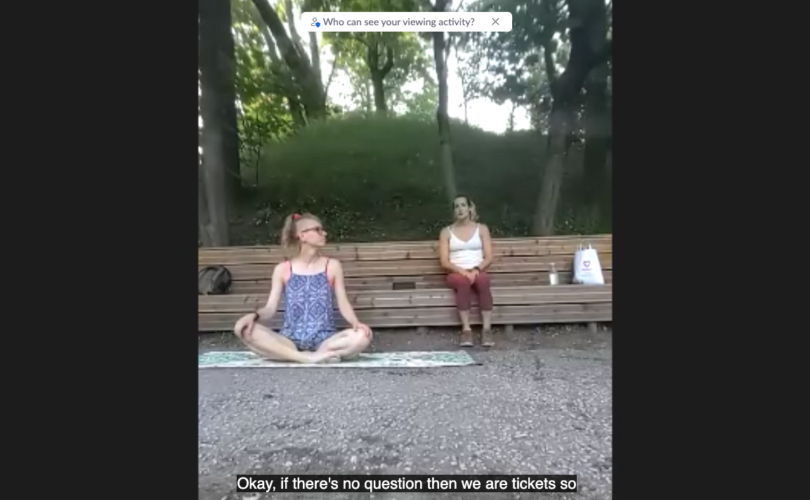
As an excellent way to break up the day, PYD staff member Neda Mustafa led a brief yoga session that could be done either seated or standing, guiding delegates through a series of stretches and poses.
Through this 30-minute activity, Neda helped to energize the participants and give them the opportunity to move their body after three days of learning. Neda shared, “Using the benefits of breathing and gentle movements with options for modifications, YLF’s Yoga session was a great way to unwind and practice self-care during our busy YLF schedule.”
Disability is a Qualification for Employment and That Matters for Business
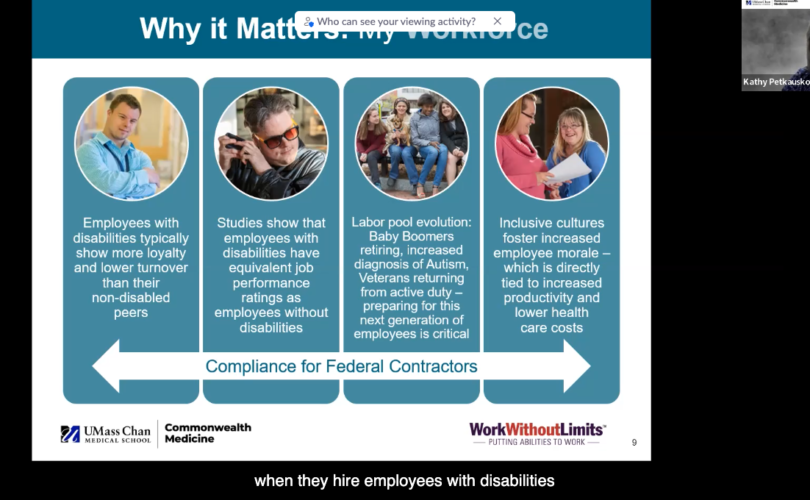
Kathy Petkauskos, Director at Work Without Limits at UMass Chan Medical School, gave a workshop that explained the importance of hiring people with disabilities and how it’s a huge benefit for companies. Her session aimed to help delegates:
- Identify at least 2 benefits for employers to include people with disabilities in the workplace
- Identify at least 2 personal life experiences or skills that would position you as an asset to any employer
As Kathy explained, “Many businesses that employ people with disabilities report that they see an increase in morale and productivity amongst all of their employees.”
Other benefits include:
- More loyalty and lower turnover than their peers without disabilities
- Equivalent job ratings as employees without disabilities
- Labor pool evolution preparation
And more. At the end of the session, Kathy left participants with the following homework:
- Write down 3-5 words that describe the skills they have as a person with a disability that could make them a great candidate for employment.
- Share WHY they would be a great employee through examples of how they executed that skill.
- Use those examples when practicing for interviews and developing their resume.
With a list of action items in place, our youth felt excited about advancing towards the next step in their career.
Making Your Voice Heard: Legislative Advocacy
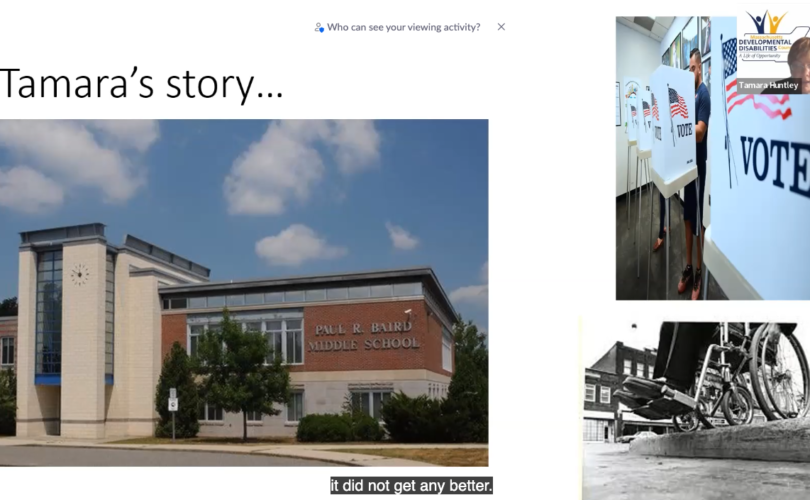
What happens when you share your story? Tamara Huntley and Andre Williams from the Massachusetts Developmental Disabilities Council joined us to give a workshop on legislative advocacy by sharing their own stories.
They started by sharing the definition of legislative advocacy: “Legislative advocacy is advocating for stuff that’s important, possibly working and organizing for laws to be put into place, and it’s really working with our higher powers in government.”
Tamara talked about her story of struggling to vote in an election at a middle school in her town due to its inaccessibility, which inspired her to write a letter to the disability commission to encourage accessibility. Andre told his story of speaking with Representative Barber to create an act for developing higher educational opportunities for students with intellectual disabilities, autism, and other developmental disabilities who have exited special education.
By advocating for themselves, both Tamara and Andre were able to make a change in their respective communities, helping to show participants that when they share their stories and speak up, they too can make a change involving something they’re passionate about.
Self-Advocacy Workshop
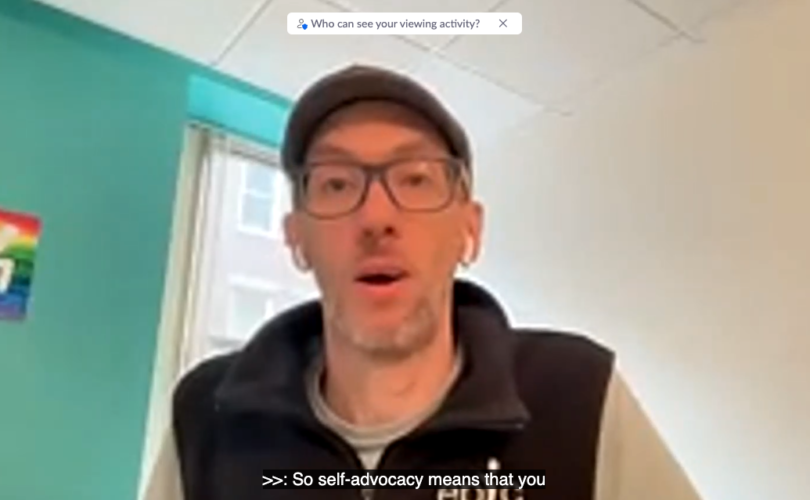
Continuing with the advocacy theme, Jeff Lafata-Hernandez from Empowering People for Inclusive Communities (EPIC) dove further into this topic.
Jeff started off by sharing what self-advocacy means, which refers to an individual’s ability to effectively communicate their own interests, desires, needs, and rights. He encouraged participants to share examples of how they can communicate what’s important to them to others in order to make some type of change.
As he explained with self-advocacy, “With every choice we make as a self-advocate, something’s going to happen. It could be good, it could be bad, it might be pretty neutral. But if we’re advocating for something, something is going to happen in return.”
He helped participants to realize that no matter what they feel passionate about, taking action will encourage change in some way.
Tuesday, June 28th
The fourth day of YLF was centered around careers, entrepreneurship, and networks, helping delegates to understand how much they can accomplish in their professional lives when they have the right tools at their disposal.
Career Bruncheon and Keynote with Collette Divitto
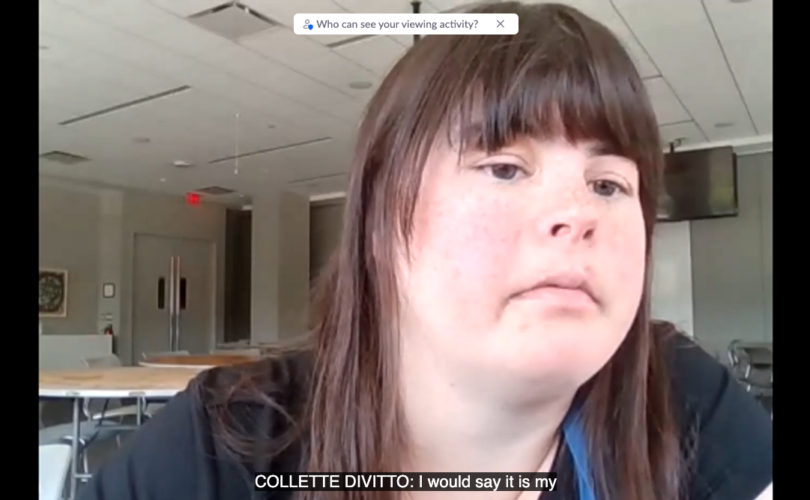
Anna Hermann from the Massachusetts Rehabilitation Commission (MRC) kicked off the morning with the Career Bruncheon, opening it up to PYD staff member Mehdi Raoufi to introduce Denny’s Hungry for Education, who has been a long-time partner of this event.
From there, Mehdi introduced Collette Divitto, the keynote speaker for the morning. Born with Down syndrome, Collette is an entrepreneur, founder, motivational speaker, and boss. Featured in a variety of prominent publications, Collette has sold over 400,000 cookies to date through her company Collettey’s Cookies, which now employs 15 people, several with disabilities. Collette travels around the country to share her inspiring story and constantly encourages people to focus on their abilities rather than what they can’t do.
Her inspiration for her business started when she graduated from a 3-year program at Clemson University in only two years. Despite this remarkable achievement, Collette was interviewed numerous times yet was unable to get a job. Pushing her disappointment aside, she turned her passion for baking into a business.
When giving career advice, Collette shared, “It is really important to think about what you want in your life and to be honest with yourself in getting the help you need to have that life. You have to ask yourself, ‘Do I want that and am I willing to work hard?’”
That’s exactly what she did.
Participants felt inspired by Collette and her story, asking her a variety of questions. Collette is “living proof” that regardless of your disabilities, you’re capable of achieving whatever you set your mind to.
Resource Fair
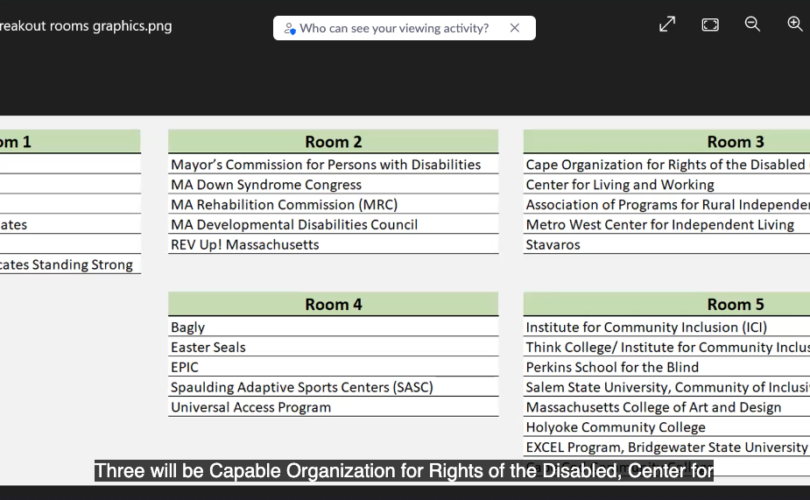
After Collette’s keynote, participants were organized into various breakout rooms to meet with mentors from approximately 30 organizations during our resource fair. Throughout this session, they were able to ask various professionals about their careers and receive advice that they can apply to their own employment journeys.
Some of these organizations included Mass Advocates Standing Strong, Work Without Limits, the City of Boston Mayor’s Commission on Disability, the Boston Center for Independent Living, BAGLY, Easterseals Massachusetts, and more. We’re grateful for these ongoing partnerships.
Social Engagement – Connecting with Crafts
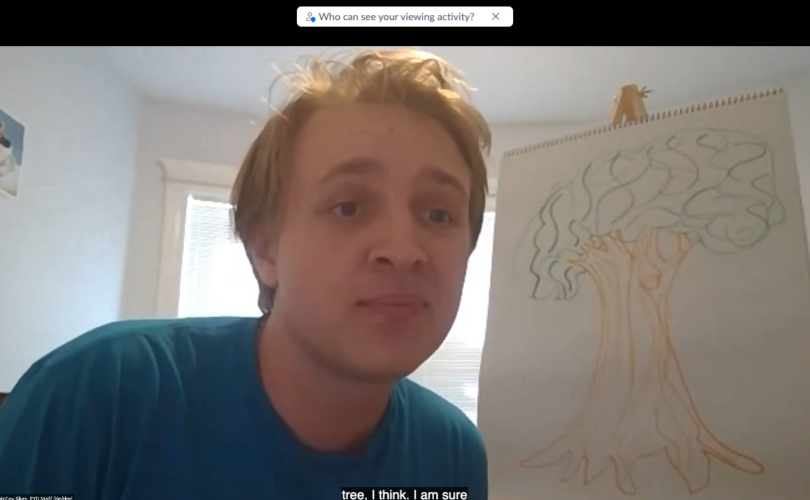
To add some creativity to the day, PYD staff member McCoy Sikes led a craft activity of drawing a tree using two different methods. The first method involved drawing a tree based on the idea of it from one’s memory while the second method involved drawing a tree by following a picture of one, allowing participants to see the differences. Comparing the two different drawings, PYD participant Amelia concluded that both are good, and one is not better than the other — they are just expressed differently, which is an important life lesson.
After the drawings, McCoy took a picture of a famous mystery person (Albert Einstein) and split it into many pieces, sending each participant only one piece of that photograph. Each person then needed to draw only that one piece of the photograph, and at the end, everyone took a picture of their artwork and sent it in so that McCoy could combine all of the pictures to create Albert’s face.
As a form of self-expression and stress relief, participants were able to express their interests and relax through art after a busy few days of learning, participating, and connecting with others.
Social Engagement – Creative Share
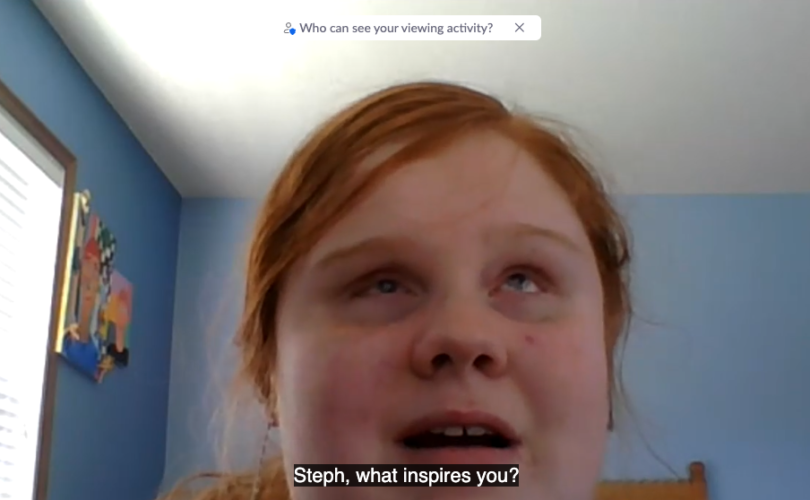
PYD staff member Deep Chinappa led participants through another activity known as a “creative share,” where they had the option to answer any one of these questions:
- One thing we don’t know about you. Who are you?
- When you wake up in the morning, share one thought that you think about every day.
- How do you handle your young adult life? What’s the most important part of who you want to be in the future?
- Why do you think you spend so much time on your phone?
- What kind of music / song / book / movie inspires you?
By answering these questions and sharing more about themselves, they were able to find similarities with each other, build relationships, and get comfortable holding conversations with others. During this workshop, a participant even shares that she wishes YLF could be longer, which is a testament to how much our youth enjoyed YLF!
Wednesday, June 29th
Before a series of group projects and social engagements, participants attended one workshop relating to the #TeachDisabilityHistory movement, started by Easterseals Massachusetts.
#TeachDisabilityHistory Workshop
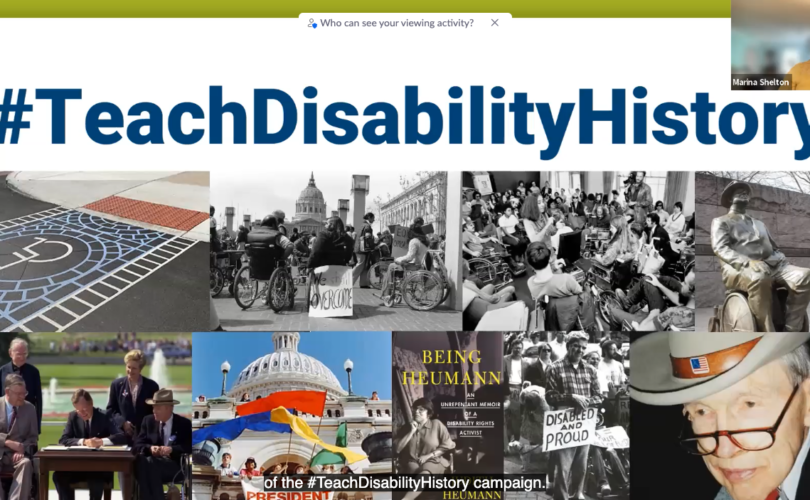
Paul Madeiros, CEO and President of Easterseals Massachusetts, led a workshop to guide delegates through disability history and explain the importance of schools teaching it to their students.
As Paul shared, “We’re so passionate about disability history and making sure we teach disability history to everybody in Massachusetts, but especially starting with the kids in public schools because if we start teaching everyone exactly what it’s taken to get the rights that we all have today, I think we’re all much less likely for people to try and take those rights away.”
Desiree Forte, also from Easterseals Massachusetts, gave an overview of the #TeachDisabilityHistory campaign and played a video to share why it’s important to teach it. During this presentation, participants learned that youth gathered together over ten years to influence the governor of Massachusetts to sign a proclamation that would make October Disability History Month in the state, but the act didn’t mandate that anything be taught in schools. Youth wanted that to change, so this campaign explained the importance of sharing this part of history, which made the participants feel valued.
Small Group Project – Wednesday Morning + Afternoon Sessions
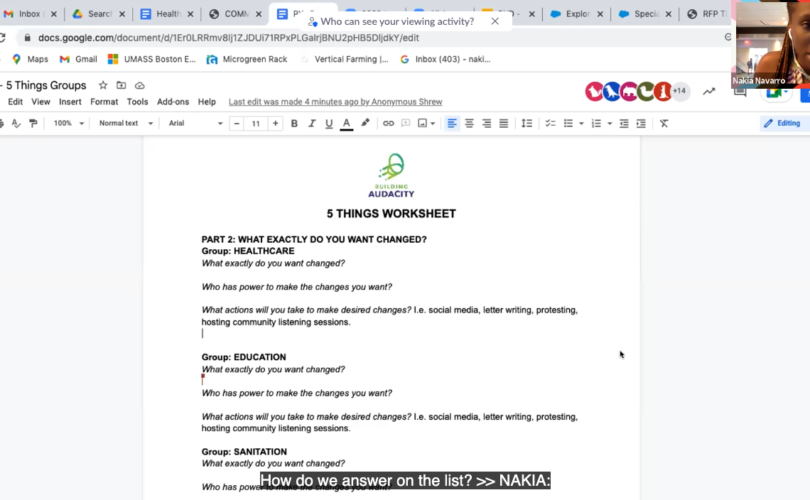
Split up into two sessions on this day, Nakia Navarro worked with the participants to wrap up their “5 things to change” project they were working on since the start of YLF. Everyone came together to develop a campaign around healthcare, where they created a presentation to share the reason for their campaign, note what they wanted to change, list actions they would take, outline hashtags they would use on social media to spread awareness, and more.
This activity gave participants the tools, processes, and resources they would need if they wanted to make a change within their own community. From there, everyone completed an activity from PYD’s Learn platform, where they shared values that were important to them and then used those to introduce goals they have.
Nakia helped everyone to understand that they have the power and knowledge to make a difference in the world, which is an important reminder! PYD participant Anthony remarked, “I learned about disabilities and how people handle and overcome them since everyone at YLF has a disability, physical or mental. I was also able to learn the ways disabilities are handled throughout the US and the world. YLF also was very good at teaching people how to be successful with a disability.”
Social Engagement – Open Mic
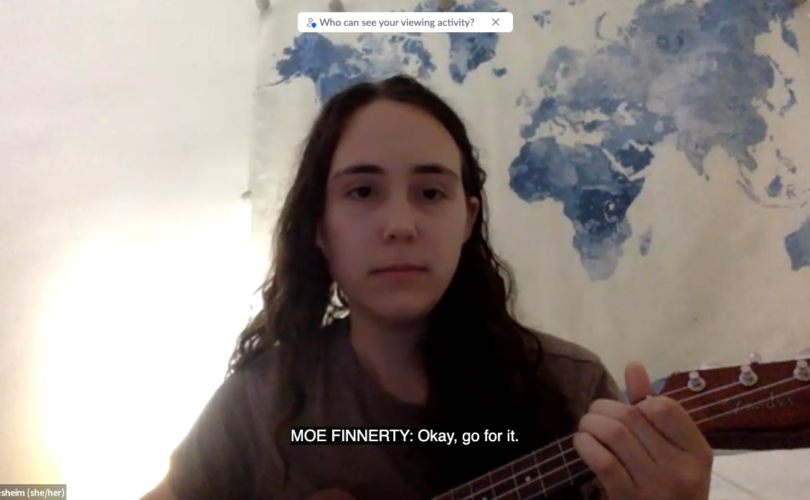
Who doesn’t love showing off their talents and seeing the talents of others? In this open mic activity, participants introduced themselves and talked about a talent they have, showing it on camera. They revealed many amazing talents, including singing, dancing, doing flexible stunts, playing instruments, reading poems, and more.
It’s incredible to see how talented these individuals are and watch others cheer them on from the sidelines, helping to build their confidence. PYD participant Ashley exclaimed, “What I liked about the Open Mic was that you got to do whatever you wanted to do, either dance, sing or what your talent is!”
Social Engagement – Creative Station
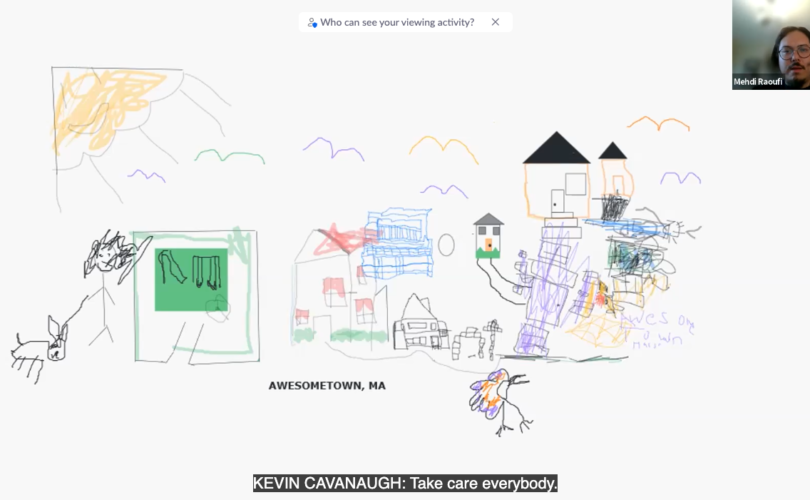
After the open mic session, participants went into a “creative station” activity led by PYD staff member Mehdi Raoufi. Mehdi started by asking everyone to share what they’re most creative at before leading them into the following warmups:
- Top 10: This involves asking someone a question on the spot where they have to share their “top 10” of a category, but their answer can be complete nonsense! One prompt Mehdi gave was, “Name your top 10 species of fish!” Once the person gets to 10, everyone celebrates.
- One Word at a Time Story: Everyone comes together to tell a story by each person only sharing one word, helping to build it from the ground up.
- This is a What: Mehdi shared one thing to draw, such as the first thing you picked up today when you woke up, and then everyone drew it, encouraging people to guess what it was.
Throughout this time, participants were able to express their creativity, focus on teamwork, be silly, and exercise their minds. At the end of the activity, Mehdi shared, “I always enjoy engaging in a creative arts process with PYD youth. During the creation station, attendees used the Whiteboard function to create a group drawing of a neighborhood, allowing for each attendee to connect and create socially via zoom. PYD youth always come with a strong willingness to participate and work together to support each other. I appreciate PYD’s ability to create spaces for creative connection!”
Thursday, June 30th
Day six marked the last day of YLF! Incorporating themes of empowerment and confidence, delegates left the day feeling energized and excited about what’s to come.
Small Group Presentations
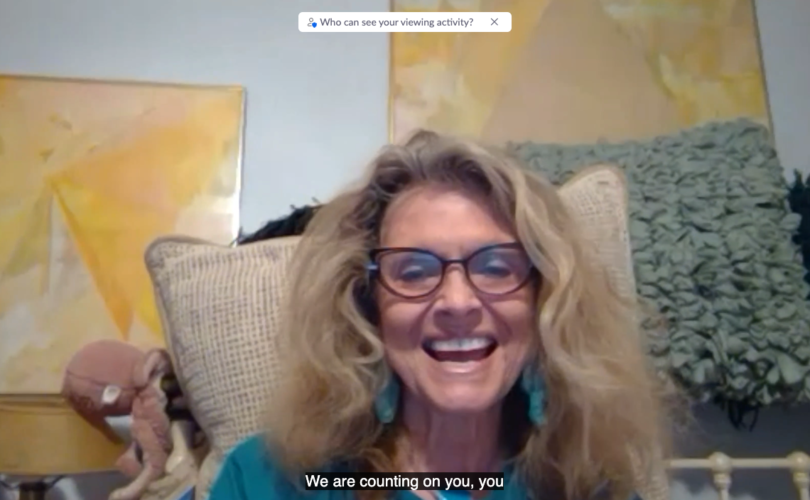
At the start of the day, Regina gave a closing remark and shared the history of YLF before passing off the mic to PYD staff member Piper Slowinski to give an insight into the Learn platform. Participants were able to give a shoutout about their favorite part of YLF, which was amazing to hear what they enjoyed most – and especially helpful to know when we begin preparing for YLF 2023.
Nakia Navarro finalized the small group project about making change by having all participants present their campaigns with their groups, walking the audience through the social issue they want to change all the way through to how they will change it and who they will bring in to help.
Nakia said it best: “We all have issues, we all have things that we want to change … You don’t need a dime to make change. You just need a voice, power, and consistency.”
Closing Ceremony with Keynote Aaron Fotheringham
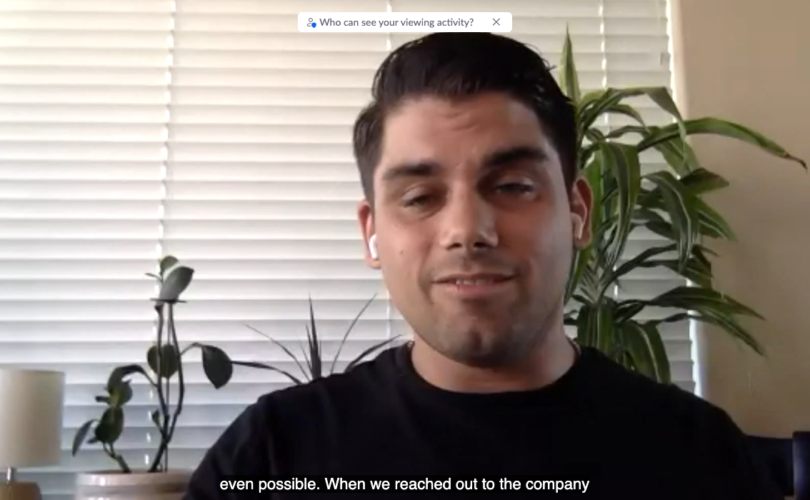
There was no better way to end a fun-filled week of YLF than by Aaron Fotheringham sharing a keynote!
Born with Spina Bifida, Aaron started riding at skateparks at the age of 8 and became the first rider to land a wheelchair backflip in 2006, double backflip in 2010, his very first front flip in New Zealand in 2011. He shocked Brazilians by jumping and successfully landing a 50-ft gap off of the Mega Ramp in his chair in 2012. Aaron is a 4-time winner of the WCMX World Championships and has recently executed the first Wheelchair Flair/backflip 180. A pioneer, Aaron never lets anything stop him through the power of manifesting his incredible spirit.
While talking about his story, Aaron shared the following: “So many people that go through kind of what we go through with life with a disability, it forces you to adapt and really push yourself … The passion that a lot of disabled athletes have, and ultimately seeing that get more spotlight, more recognition, would be overall more inspiring.”
Get Involved for Next Year
Does reading about YLF make you feel excited to participate next year? We feel the same way! Whether you’d like to participate as a delegate, peer leader, mentor, or something else, we always welcome volunteers. Although we haven’t released the details for 2023 yet, stay tuned for more details and visit our website to learn more.

